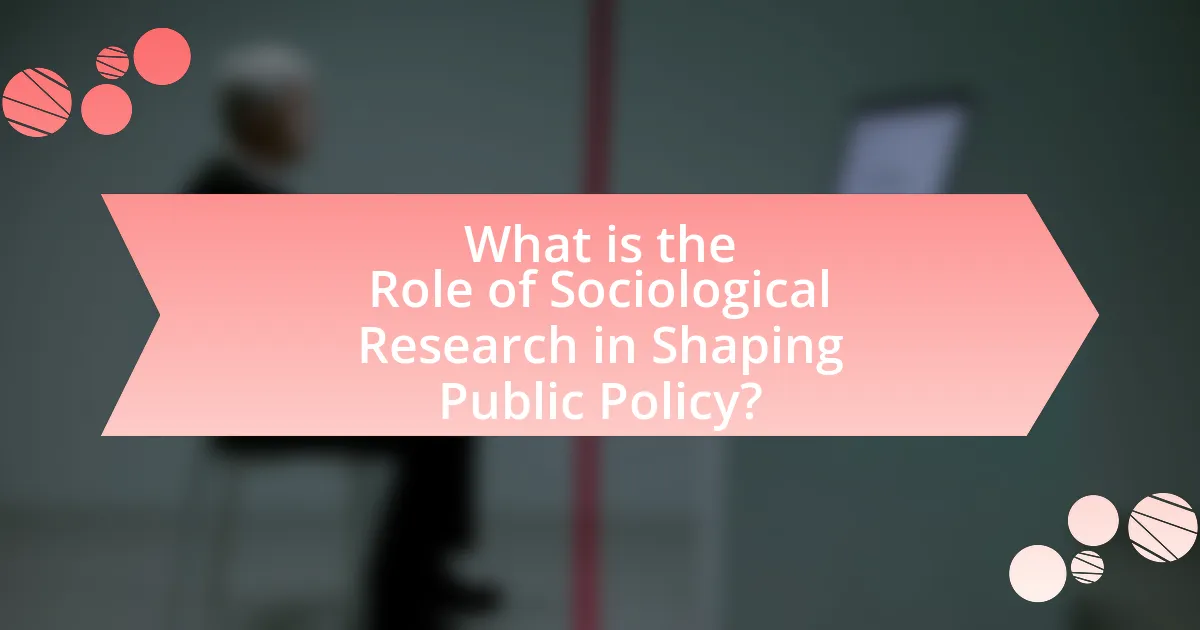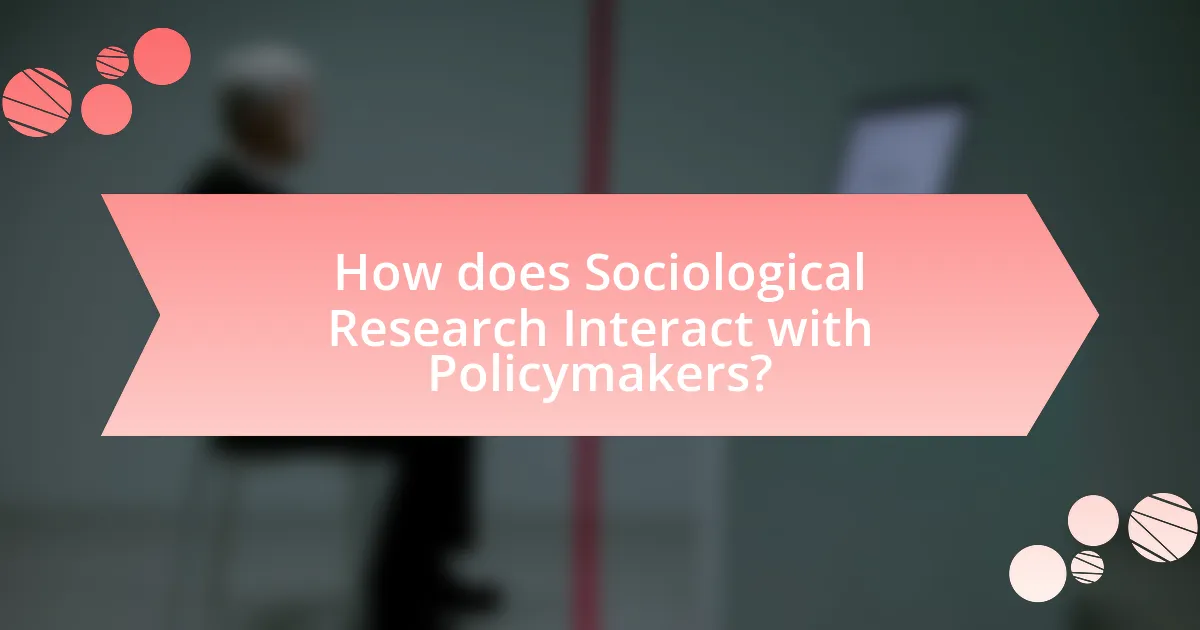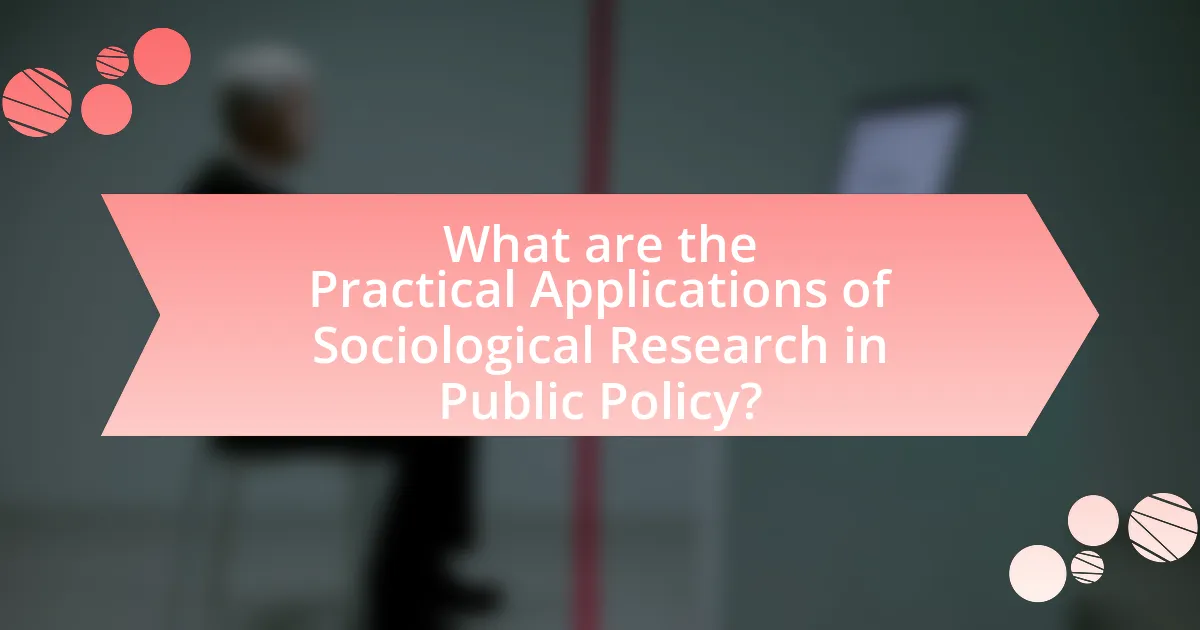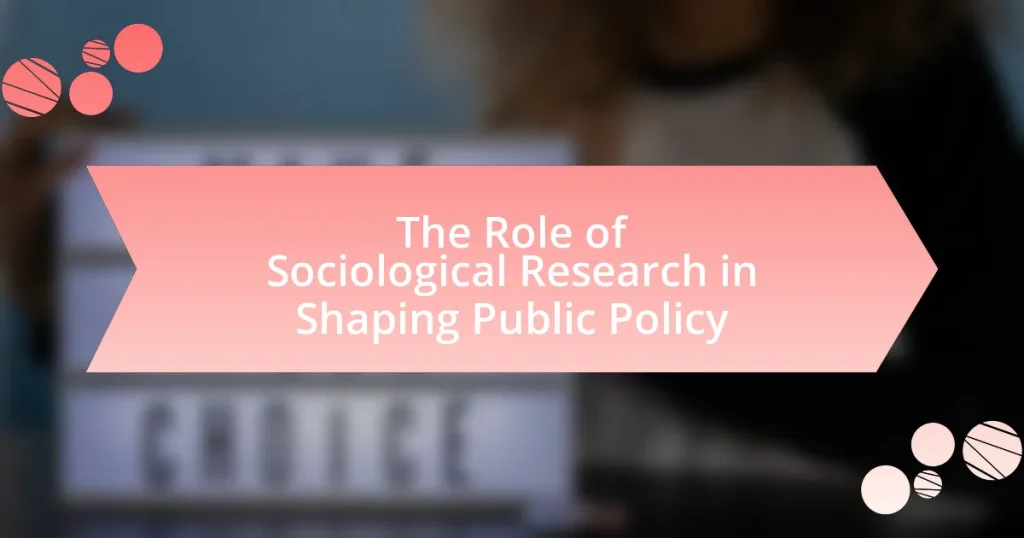Sociological research is essential in shaping public policy by providing empirical data and insights into social behaviors, structures, and issues. It informs policymakers about the needs of various communities, guiding targeted interventions and evaluating the effectiveness of existing policies. The article explores the methodologies used in sociological research, the challenges faced in applying findings to policy-making, and the importance of collaboration between sociologists and policymakers. Additionally, it highlights the practical applications of sociological research in areas such as education and health policy, emphasizing the need for evidence-based approaches to address societal issues effectively.

What is the Role of Sociological Research in Shaping Public Policy?
Sociological research plays a critical role in shaping public policy by providing empirical data and insights into social behaviors, structures, and issues. This research informs policymakers about the needs and challenges faced by different communities, enabling the development of targeted interventions. For instance, studies on poverty and inequality, such as those conducted by the Pew Research Center, reveal the socio-economic factors affecting marginalized groups, guiding policies aimed at reducing disparities. Additionally, sociological research evaluates the effectiveness of existing policies, allowing for adjustments based on evidence rather than assumptions. This evidence-based approach ensures that public policies are more effective and responsive to the population’s needs.
How does sociological research influence policy decisions?
Sociological research influences policy decisions by providing empirical evidence that informs lawmakers about social issues and the needs of communities. For instance, studies on poverty and inequality reveal the effectiveness of social programs, guiding policymakers in resource allocation. Research conducted by the Pew Research Center shows that data on public opinion can shape legislative agendas, as seen in the response to social movements advocating for racial justice, which prompted policy changes at local and national levels. This evidence-based approach ensures that policies are responsive to the actual conditions and experiences of the population, ultimately leading to more effective governance.
What methodologies are commonly used in sociological research for policy analysis?
Common methodologies used in sociological research for policy analysis include qualitative methods, quantitative methods, and mixed-methods approaches. Qualitative methods, such as interviews and focus groups, allow researchers to gather in-depth insights into social phenomena and individual experiences, which can inform policy decisions. Quantitative methods, including surveys and statistical analysis, provide measurable data that can identify trends and correlations relevant to policy issues. Mixed-methods approaches combine both qualitative and quantitative techniques, offering a comprehensive understanding of complex social problems. These methodologies are validated by their widespread application in studies like the Pew Research Center’s reports on social attitudes, which utilize both qualitative interviews and quantitative surveys to shape public policy discussions.
How do sociologists gather data relevant to public policy?
Sociologists gather data relevant to public policy through various research methods, including surveys, interviews, ethnography, and analysis of existing data. Surveys allow sociologists to collect quantitative data from a large population, providing statistical insights into public opinions and behaviors. Interviews offer qualitative insights, enabling in-depth understanding of individual experiences and perspectives related to policy issues. Ethnographic studies involve immersive observation of communities, revealing contextual factors influencing public policy. Additionally, sociologists analyze existing data from governmental and non-governmental sources, which can highlight trends and inform policy decisions. These methods collectively contribute to a comprehensive understanding of social dynamics that shape public policy.
Why is sociological research important for understanding societal issues?
Sociological research is crucial for understanding societal issues because it provides empirical data and theoretical frameworks that reveal the complexities of social behavior and structures. This research helps identify patterns, trends, and correlations within society, enabling policymakers to make informed decisions. For instance, studies such as the Pew Research Center’s analysis on social media’s impact on public opinion illustrate how sociological insights can inform strategies to address misinformation and its societal effects. By grounding public policy in sociological findings, governments can better address issues like inequality, crime, and health disparities, ultimately leading to more effective and equitable solutions.
What are the key societal issues addressed by sociological research?
Sociological research addresses key societal issues such as inequality, crime, education, health disparities, and family dynamics. These issues are examined to understand their impact on social structures and individual behaviors. For instance, studies on income inequality reveal how economic disparities affect access to education and healthcare, influencing public policy decisions aimed at reducing these gaps. Research on crime rates often highlights the relationship between socioeconomic status and criminal behavior, informing law enforcement strategies and rehabilitation programs. Additionally, sociological investigations into health disparities provide insights into how social determinants affect health outcomes, guiding public health initiatives. Overall, sociological research plays a crucial role in identifying and analyzing these societal issues, ultimately shaping effective public policies.
How does sociological research contribute to identifying the needs of different communities?
Sociological research identifies the needs of different communities by systematically analyzing social behaviors, structures, and interactions. This research employs various methodologies, such as surveys, interviews, and observational studies, to gather data on community dynamics, which helps in understanding specific challenges and requirements faced by diverse groups. For instance, the American Sociological Association highlights that sociological studies can reveal disparities in access to resources, healthcare, and education, thereby informing policymakers about the unique needs of marginalized populations. By providing empirical evidence, sociological research enables targeted interventions and resource allocation, ultimately shaping effective public policies that address the identified needs of communities.
What are the challenges faced by sociological research in public policy?
Sociological research in public policy faces several challenges, including data accessibility, methodological limitations, and the influence of political agendas. Data accessibility issues arise when researchers encounter difficulties in obtaining reliable and comprehensive data, which can hinder the validity of their findings. Methodological limitations, such as the complexity of social phenomena and the need for interdisciplinary approaches, can complicate the research process and lead to incomplete analyses. Additionally, political agendas often shape the interpretation and application of sociological research, as policymakers may prioritize certain findings that align with their interests while disregarding others. These challenges collectively impact the effectiveness and credibility of sociological contributions to public policy.
How do biases in research affect policy outcomes?
Biases in research significantly distort policy outcomes by skewing the evidence base that informs decision-making. When research is influenced by biases—such as selection bias, confirmation bias, or funding bias—it can lead to the prioritization of certain issues over others, misrepresentation of data, and ultimately the implementation of ineffective or harmful policies. For instance, a study published in the journal “Health Affairs” found that research funded by pharmaceutical companies often favors positive outcomes for their products, which can lead to policies that promote these medications without adequate scrutiny of their risks or alternatives. This demonstrates how biased research can misguide policymakers, resulting in public health strategies that may not serve the best interests of the population.
What limitations exist in the application of sociological findings to policy-making?
Sociological findings face several limitations in their application to policy-making, primarily due to issues of generalizability, complexity of social phenomena, and the influence of political agendas. Generalizability is a concern because sociological research often relies on specific contexts or populations, making it difficult to apply findings universally across diverse settings. For instance, a study on urban poverty may not yield applicable solutions for rural poverty, limiting the effectiveness of policies derived from such research.
Additionally, the complexity of social phenomena means that sociological findings may not capture the multifaceted nature of societal issues, leading to oversimplified policy solutions. For example, addressing crime through a purely sociological lens might overlook economic or psychological factors that also contribute to criminal behavior.
Finally, political agendas can distort the application of sociological findings, as policymakers may selectively interpret or ignore research that does not align with their objectives. This selective use can result in policies that are not evidence-based or that fail to address the root causes of social issues, undermining the potential benefits of sociological insights in public policy.

How does Sociological Research Interact with Policymakers?
Sociological research interacts with policymakers by providing empirical data and insights that inform decision-making processes. This interaction occurs through various channels, including research reports, policy briefs, and direct consultations, where sociologists present findings on social issues such as inequality, education, and health. For instance, studies conducted by the American Sociological Association have demonstrated how sociological insights can lead to more effective social policies, as seen in the implementation of evidence-based programs aimed at reducing poverty. Such research not only highlights the complexities of social phenomena but also offers actionable recommendations that policymakers can utilize to address societal challenges effectively.
What role do sociologists play in the policy-making process?
Sociologists play a critical role in the policy-making process by providing empirical research and insights that inform decisions on social issues. Their expertise helps identify social problems, understand community dynamics, and evaluate the impact of policies on different populations. For instance, sociologists conduct studies that reveal the effects of poverty on education, which can guide policymakers in developing targeted interventions. Research from the American Sociological Association indicates that sociological findings contribute to evidence-based policy-making, ensuring that policies are grounded in real-world data and social realities.
How do sociologists communicate their findings to policymakers?
Sociologists communicate their findings to policymakers primarily through research reports, policy briefs, and presentations. These formats allow sociologists to distill complex data into actionable insights that can inform decision-making. For instance, the American Sociological Association emphasizes the importance of translating academic research into accessible language and relevant recommendations for policymakers, ensuring that findings are not only understood but also applicable in real-world contexts. Additionally, sociologists often engage in direct dialogue with policymakers through workshops and advisory roles, facilitating a two-way exchange of information that enhances the relevance of sociological insights in shaping effective public policy.
What strategies can sociologists use to advocate for evidence-based policy?
Sociologists can advocate for evidence-based policy by employing strategies such as conducting rigorous research, engaging in public discourse, and collaborating with policymakers. Rigorous research provides empirical data that can inform policy decisions, as seen in studies like the “What Works Clearinghouse,” which evaluates the effectiveness of various programs. Engaging in public discourse allows sociologists to communicate findings to a broader audience, influencing public opinion and policy agendas. Collaboration with policymakers ensures that sociological insights are integrated into the legislative process, exemplified by initiatives like the “Sociology and Public Policy” program, which connects researchers with government officials to address social issues effectively.
How can collaboration between sociologists and policymakers be improved?
Collaboration between sociologists and policymakers can be improved by establishing structured communication channels and collaborative frameworks. These frameworks can facilitate regular interactions, allowing sociologists to present research findings in accessible formats that directly address policy concerns. For instance, initiatives like the American Sociological Association’s “Sociology in the Public Sphere” program demonstrate effective partnerships, where sociologists engage with policymakers to translate complex data into actionable insights. Such collaborations can lead to evidence-based policy decisions that are informed by sociological research, ultimately enhancing the relevance and impact of social science in public policy.
What are the benefits of interdisciplinary approaches in policy development?
Interdisciplinary approaches in policy development enhance the effectiveness and comprehensiveness of policies by integrating diverse perspectives and expertise. This integration allows for a more holistic understanding of complex social issues, leading to more informed decision-making. For instance, combining insights from sociology, economics, and environmental science can address multifaceted challenges like climate change, resulting in policies that are not only environmentally sustainable but also socially equitable and economically viable. Research indicates that interdisciplinary collaboration can improve policy outcomes; a study by the National Academy of Sciences found that interdisciplinary teams are more likely to produce innovative solutions and effective policies compared to single-discipline approaches.
How can sociological research be integrated into the policy cycle?
Sociological research can be integrated into the policy cycle by providing empirical data and insights that inform decision-making at various stages. This integration occurs through systematic collection and analysis of social data, which helps identify societal needs and issues, thereby guiding policy formulation. For instance, sociological studies on poverty can reveal the underlying causes and demographics affected, enabling policymakers to design targeted interventions. Additionally, during the implementation phase, sociological research can evaluate the effectiveness of policies, ensuring they meet the intended goals and adapt to changing social dynamics. Evidence from studies, such as the “Social Determinants of Health” report by the World Health Organization, illustrates how sociological factors influence health outcomes, reinforcing the necessity of incorporating sociological insights into health policy development.

What are the Practical Applications of Sociological Research in Public Policy?
Sociological research has practical applications in public policy by providing data-driven insights that inform decision-making and program development. For instance, studies on social behavior and community needs help policymakers design effective interventions, such as targeted social services or educational programs. Research conducted by the Pew Research Center indicates that understanding demographic trends and social attitudes can lead to more inclusive policies that address the needs of diverse populations. Additionally, sociological research aids in evaluating the impact of existing policies, allowing for adjustments based on empirical evidence, thereby enhancing the effectiveness of public initiatives.
How can sociological research inform specific policy areas?
Sociological research can inform specific policy areas by providing empirical data and insights into social behaviors, structures, and issues. For instance, studies on income inequality reveal how economic disparities affect social mobility, guiding policymakers in designing equitable tax systems and social welfare programs. Research conducted by the Pew Research Center indicates that understanding demographic shifts can help in formulating immigration policies that reflect societal needs and values. Additionally, sociological studies on education highlight the impact of socioeconomic factors on student performance, which can lead to targeted interventions in educational policy. These examples demonstrate how sociological research serves as a foundation for evidence-based policy decisions, ensuring that they address the complexities of social dynamics effectively.
What impact does sociological research have on education policy?
Sociological research significantly influences education policy by providing empirical evidence that informs decision-making and reforms. For instance, studies on socioeconomic disparities reveal how factors like income and family background affect educational outcomes, prompting policies aimed at equity, such as increased funding for under-resourced schools. Research conducted by the National Center for Education Statistics shows that students from low-income families are less likely to graduate high school, which has led to initiatives like the Title I program that allocates federal funds to support disadvantaged schools. This demonstrates how sociological insights directly shape policies to address educational inequalities and improve student success.
How does sociological research shape health policy initiatives?
Sociological research shapes health policy initiatives by providing insights into social determinants of health, which inform policy decisions. For instance, studies have shown that factors such as socioeconomic status, education, and community environment significantly impact health outcomes. Research conducted by the World Health Organization highlights that addressing these social determinants can lead to more effective health interventions and policies. By analyzing patterns of health disparities, sociological research enables policymakers to target resources and implement strategies that promote equity in health access and outcomes.
What best practices should sociologists follow when conducting research for policy?
Sociologists should prioritize ethical considerations, methodological rigor, and stakeholder engagement when conducting research for policy. Ethical considerations involve obtaining informed consent and ensuring confidentiality to protect participants, as highlighted by the American Sociological Association’s Code of Ethics. Methodological rigor requires using appropriate research designs and data analysis techniques to ensure validity and reliability, as evidenced by the replication of studies in sociology that enhance credibility. Stakeholder engagement is crucial for ensuring that research addresses relevant issues and incorporates diverse perspectives, which can lead to more effective policy outcomes, as demonstrated in collaborative research initiatives that have successfully influenced public policy decisions.
How can sociologists ensure their research is relevant and actionable for policymakers?
Sociologists can ensure their research is relevant and actionable for policymakers by actively engaging with policymakers throughout the research process. This engagement includes identifying pressing social issues that policymakers face, collaborating on research questions, and disseminating findings in accessible formats. For instance, studies like “The Role of Social Science in Policy Making” by the National Academy of Sciences emphasize the importance of co-producing knowledge with stakeholders to enhance the applicability of research. By aligning their research objectives with the needs of policymakers and providing clear, evidence-based recommendations, sociologists can significantly influence policy decisions.
What ethical considerations should sociologists keep in mind when influencing public policy?
Sociologists should prioritize informed consent, confidentiality, and the potential impact of their research when influencing public policy. Informed consent ensures that participants understand the purpose and implications of the research, fostering trust and ethical integrity. Confidentiality protects the identities and data of participants, which is crucial for maintaining privacy and encouraging honest participation. Additionally, sociologists must consider the broader societal implications of their findings, as policies derived from their research can significantly affect communities. For instance, the American Sociological Association emphasizes the importance of ethical standards in research to prevent harm and promote social justice, highlighting that sociologists have a responsibility to advocate for policies that benefit society as a whole.
